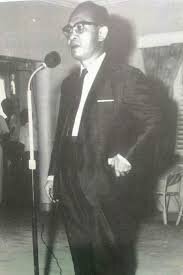
Two White Men and a Chief Minister: A Fall from Grace and Then a Revival of Sarawak.
Stephen Kalong Ningkan was born on 20 August 1920. His Chinese grandfather adopted him, lived in China and spoke Mandarin. He was a clerk with the Rubber Fund and was with the Sarawak Constabulary during the war. Furthermore, he became a teacher and, following the Iban tradition of wandering, was a hospital assistant in Brunei for the Shell Hospital for the next ten years. In 1961, he founded SNAP, a political party, and became Sarawak’s first Chief minister from July 22, 1963 to ~July 13, 1966. (An AI Bot provides the date as September 1966)
According to the London Agreement signed in 1963, Tony Shaw (State Secretary), John Pike (Financial Secretary) and several other expatriates agreed to serve Sarawak until 31 August 1967. However, there was considerable pressure to replace them as soon as possible.
Tony Shaw and John Pike had been close and trusted advisers to Stephen Kalong Ningkan. Shaw was appointed as State Secretary, charged with guiding Sarawak through its integration with Kuala Lumpur. John Pike became Financial Secretary after the current one declined to continue. He was acting Chief Secretary when 7600 Chinese were removed during the Communist emergency. He was abruptly replaced in 1966.
These three individuals, Shaw, Pike and Ningkan would become involved in a triangle which would result in the ouster of the two white men from Sarawak and the downfall of Chief Minister Ningkan.
The Sarawak Government Asian Officers Union (SAGOU) wrote a letter in June 1965 to the Chief Minister Ningkan asking for a speedier replacement of the expats. SAGOU pointed out that their services could be dispensed with by paying off their contracts. Besides, the expats tended to “discredit the position of the country according to the outside world.”
The Prime Minister of Malaysia, Tunku Abdul Rahman, echoing SAGOU points, said the Sarawak government remained colonial primarily in nature. Some saw the expat officers as a barrier to the relationship between Sarawak and the Federal government in Kuala Lumpur. Others saw the expats as obstacles to their careers. Tawi Sli spoke about the need for an independent country administered by its own local officers and then gave Shaw ten days to leave the state. Shaw protested.
A high-powered delegation led by Home Affairs Minister Tun Ismail along with Temmengong Jugah, Abdul Taib and other members flew to Kuala Lumpur on 16 June. They were sequestered for the night. The next morning, the Governor, Tun Haji Openg, declared the Ningkan and his Supreme Council “ceased to hold office”. Tun Ismail issued a long press release stating their actions were constitutional. The new Chief Minister was Second Division Iban Chief Tawi Sli. Tunku also asked that Ningkan resign.
Completing the replacement of the Ningkan government on 22 June, Tawi Sli appointed five members to the Supreme Council. Two months later, he appointed two additional members. SNAP withdrew from the alliance.
The Chief Minister announced at the end of July that Shaw would leave the government at the end of August. Shaw’s departure followed a farewell lunch on 26 August, hosted by Tawi Sli while Pike, who was out of the country at the time, was told not to return to Sarawak. It was generally conceded that Pike and Shaw’s abrupt departure was not at the initiative of the Chief Minister. Although some 300 expats remained, they were either on contract or with predetermined dates to depart. Acting Chief Minister Taib announced all posts in the Sarawak government would be held by local people by October 1967.
Ningkan proceeded to take his dismissal to the High Court, where on 27 July it was declared “beyond legal power or authority.”(acting beyond one’s legal authority). He then took it to the Privy Council, where he also lost.
Parti Bumiputra, in a merger of PANAS and Berjasa, was inaugurated on 25 March 1967 and united the Sarawak Malays and Melanau. In May 1968, Angkatan Nahdatul Islam Bersatu was formed. SUPP and SNAP (led by the deposed Nanking) remained in opposition and were offered a place in a later coalition by Tun Razak. Election results on 4 July 1970 saw Parti Bumiputra win 12 seats, Pesaka 8 seats and SCA three seats, giving the Sarawak Alliance 23 votes in the 48-seat Council Negri. SUPP and SNAP won 12 seats.
SUPP and Parti Bumiputra formed a new government. Parti Bumiputra’s Abdul Rahman Ya’cob became Chief Minister. Two deputy chief ministers, Stephen Yong (SUPP) and Simon Demak Maja (Pestaka) were appointed out of the group. All the other Ministers were appointed jointly by Ya’cob and Yong. The two Chinese parties, SUPP and SCA, were excluded from the government. The Ibans won twenty seats which were split between SNAP who represent the 2nd Division Ibans and Pesaka represented the third. This split prevented the Ibans from creating a government.
Sarawak’s politics had been finally moulded into the UMNO led by the Peninsular Alliance image. A family dynasty of Chief Ministers would last until the turn of the century.
Turbulent Times in Sarawak: The End of Expatriate Influence and the Struggle for Power Over and Within the State by Vernon L. Porritt in the Borneo Research Bulletin vol 35 2005 condensed with permission from the Borneo Research Bureau.
